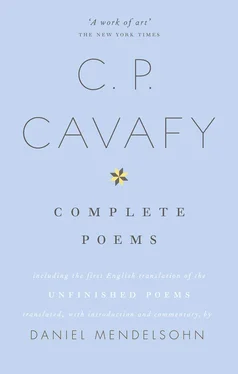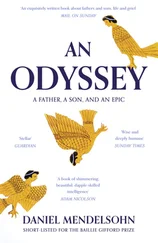King Herod inconsolably laments,
the entire country is in tears for Aristobulus
who so needlessly, accidentally drowned
playing in the water with his friends.
And also when they hear the news elsewhere,
when it gets as far as Syria,
even many of the Greeks will be distressed:
the poets and the sculptors all will mourn,
for the renown of Aristobulus had reached them,
and any vision of theirs of what a youth could be
never matched the beauty of this boy.
What statue of a god could Antioch boast
that was the like of this boy of Israel?
The Throne Princess laments and weeps:
his mother, the greatest of the Jewesses.
Alexandra laments and weeps over the calamity.—
But when she finds herself alone her anguish alters.
She groans; she seethes; she swears; she calls down curses.
How they made a fool of her! How they gulled her!
How, in the end, they had got their way!
They’ve laid the house of the Hasmoneans in ruins.
How did he manage it, that criminal of a king;
that charlatan, that miscreant, that scoundrel?
How did he manage it? What a diabolical plan,
for Mariamne not to have noticed a thing.
Had Mariamne noticed, or suspected,
she’d have found a way to save her little brother;
she’s queen after all, she could have managed something.
How they’ll gloat now, how they’ll exult in secret,
those spiteful women, Cypros and Salome;
those vile trollops, Cypros and Salome.—
And to be powerless, to be compelled
to pretend as though she believed their lies;
to be unable to go to the people,
to go outside and cry out to the Jews,
to tell, to tell how the murder had been done.
[ 1916 ; 1918]
In part to ascertain a certain date
and in part to while away the time,
last night I took down a collection
of Ptolemaic inscriptions to read.
The unstinting laudations and flatteries
are the same for all. All of them are brilliant,
glorious, mighty, beneficent;
every undertaking utterly wise.
As for the women of the line, they too,
all the Berenices and the Cleopatras, are wonderful too.
When I successfully ascertained the date
I’d have finished with the book, if a tiny,
insignificant reference to King Caesarion
hadn’t attracted my attention suddenly. . . . . .
Ah, there: you came with your indefinite
charm. In history there are only a few
lines that can be found concerning you;
and so I could fashion you more freely in my mind.
I fashioned you this way: beautiful and feeling.
My artistry gives to your face
a beauty that has a dreamy winsomeness.
And so fully did I imagine you
that yesterday, late at night, when the lamp
went out—I deliberately let it go out—
I dared to think you came into my room,
it seemed to me you stood before me: as you must have been
in Alexandria after it had been conquered,
pale and wearied, perfect in your sorrow,
still hoping they’d have mercy on you,
those vile men—who whispered “Surfeit of Caesars.”
[ 1914 ; 1918]
Nero wasn’t worried when he heard
the prophecy of the Delphic Oracle.
“Let him beware the age of seventy-three.”
He still had time to enjoy himself.
He is thirty years old. It’s quite sufficient,
this deadline that the god is giving him,
for him to think about dangers yet to come.
Now to Rome he’ll be returning a little wearied,
but exquisitely wearied by this trip
which had been endless days of diversion—
in the theatres, in the gardens, the gymnasia. …
Evenings of the cities of Achaea …
Ah, the pleasure of naked bodies above all …
So Nero. And in Spain, Galba
was secretly assembling his army and preparing it:
the old man, seventy-three years old.
[ 1915 ; 1918]
Emes, a young man of twenty-eight, came by a Tenian
ship (meaning to learn the incense trade) to this Syrian
haven. But during the voyage he took sick,
and just after he had disembarked,
he died. His burial, the very cheapest kind,
took place there. A few hours before he died,
he whispered something about “home” and “elderly parents.”
But no one knew who they might have been;
nor what his native land might be, in all the wide Greek world.
Better this way. For this way, while
he lies dead in this safe haven,
his parents will keep hoping he’s still alive.
[ 1917 ; 1918]
Whenever one of Them would cross Seleucia’s
marketplace, around the time that evening falls—
like some tall and flawlessly beautiful boy,
with the joy of incorruptibility in his eye,
with that dark and fragrant hair of his—
the passersby would stare at him
and one would ask another if he knew him,
and if he were a Syrian Greek, or foreign. But some,
who’d paid him more attention as they watched,
understood, and would make way.
And as he disappeared beneath the arcades,
among the shadows and the evening lights,
making his way to the neighborhood that comes alive
only at night—that life of revels and debauch,
of every known intoxication and lust—
they’d wonder which of Them he really was
and for which of his suspect diversions
he’d come down to walk Seleucia’s streets
from his Venerable, Sacrosanct Abode.
[ 1899 ; 1918]
The Lanes whom you loved is not here, Marcus,
in the tomb where you come to cry, and stay for hours and hours.
The Lanes whom you loved you have much closer to you,
at home, when you shut yourself in and look at his picture:
it preserves some part of what was precious in him,
it preserves some part of what you’d loved.
Remember, Marcus, how you brought the famed
Cyrenian painter back from the proconsul’s palace,
and with what artful cunning he attempted
to persuade you both, no sooner had he seen your friend,
that he simply had to do him as Hyacinth
(which would make his portrait so much better known).
But your Lanes didn’t loan out his beauty like that;
and objecting firmly he told him to represent
neither Hyacinth nor anyone else,
but Lanes, son of Rhametichos, an Alexandrian.
[ 1916 ; 1918]
Here I lie: Iases. Throughout this great city I was renowned
for being the most beautiful boy.
Admired by men of deep learning—and also by the less profound,
the common folk. Both gave equal joy
to me. But they took me so often for a Narcissus or a Hermes
that excess wore me out, and killed me. Passerby,
if you’re an Alexandrian you won’t judge me. You know the yearnings
of our life; what heat they hold; what pleasures most high.
[ 1917 ; 1917]
From the tavern brawl they brought him back to us, wounded—
our friend Rhemon, around midnight yesterday.
Through the windows we’d left open all the way
the moon illumined his beautiful body on the bed.
We’re a hodgepodge here: Syrians, Greeks, Armenians, Medes.
Rhemon too is such a one. But yesterday, as the moon
shone its light upon his sensuous face
Читать дальше












